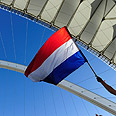
Bad news from Holland
Op-ed: Next Dutch government likely to be strongly anti-Israel, support dialogue with Hamas
The present Dutch government has been one of the country’s friendliest to Israel in a long time. In the government platform it says: “The Netherlands wants to further invest in its links with the State Israel.”
Foreign Minister Uri Rosenthal, a liberal, and Minister of Economics Maxime Verhagen, the senior Christian Democrat in the cabinet, visited Israel in June. They were accompanied by Dutch business delegations numbering 70 people who came to investigate collaboration with Israeli counterparts. A Dutch-Israeli bilateral Collaboration Council was established.
After the previous Dutch parliamentary elections of June 2010 it took more than four months to establish a minority cabinet of Liberals and Christian Democrats supported from the outside by the Freedom Party (PVV) led by Geert Wilders. It was the PVV’s recent withdrawal of support that prompted the upcoming advanced elections in September for the Lower Chamber of the Parliament, which has 150 members.
The Dutch government’s attitude toward Israel may change radically after the upcoming elections. Polls indicate that the two largest parties will be the Liberals of Prime Minister Mark Rutte and the rapidly increasing extreme left Socialist Party (SP.) Each of them is likely to win about 30 seats. The largest parties of the past decades, Labor and the Christian Democrats, will decline further and are expected to lose respectively about 10 and five seats from their present 30 and 21.
The possibility of a new government led by SP leader Emile Roemer including Labor, the small Green Party and the left-wing liberals of D66 cannot be excluded. It is likely to be strongly anti-Israel. SP says in its election program that The Netherlands will support a two-state solution. This is eyewash to look halfway respectable. SP also states that it will recognize an independent Palestinian state and make efforts for it to become a member of the United Nations.
What about Iran?
If SP succeeds, The Netherlands will support an international dialogue with all representatives of the Palestinians. This means that for SP, Hamas, with its platform promoting genocide of Jews, is an acceptable discussion partner. There is no word of rebuke in the SP platform for these potential mass murderers.
Furthermore, SP says that “As long as Israel continues to build illegally houses in occupied territory The Netherlands will condemn this and pressure the EU to suspend the association agreement with Israel which gives it fiscal advantages in exports to the countries of the EU.”
The party-program of the Green Party goes in the same direction of anti-Israel bias. It falsely claims to base itself on international law. If that were so it should have tried to bring Iran’s leaders before an international court because of their transgression of the UN genocide convention. The same steps should be promoted with respect to the Hamas leaders, advocating mass murder.
Yet the Greens have no intention of doing so. They, however, want to “search for support to suspend the association agreement with the EU if Israel continues to break international law and human rights.”
The Labor Party made fools of themselves with their previous anti-Israel party program for the June 2010 elections. Except for one sentence on the Horn of Africa, the entire section on instable regions was devoted to the Palestinian-Israeli conflict, with a substantial anti-Israeli slant. This time the platform says more vaguely that The Netherlands will stop its pro-Israeli Dutch policy and align itself with the European Union one.
The Freedom Party of Geert Wilders may end up as the third largest party, with about 20 seats. Its program indicates that it intends to remain in the opposition in the upcoming economically difficult parliamentary period. Its focus is that The Netherlands should leave the European Union and that Islam should not be considered as a religion but as an ideology.
The PVV has the image of being a supporter of Israel. At the same time its program promotes the prohibition of ritual slaughter, even if it is done after stunning. It is one of the many ways – including forbidding the Koran – with which it wants to limit the development of Islam in The Netherlands.
This position goes much further than last year’s private law of the Party for the Animals, which wanted to prohibit unstunned religious slaughter. It passed the Lower Chamber but failed in the Senate. The only Freedom Party parliamentarian who voted against this law was Wim Kortenoeven. He has recently left the party and will not stand in the upcoming elections.
The Liberals will remain pro-Israel yet they will be unable to form a coalition with only similar inclined parties. Israel’s greatest supporter among the Christian Democrats, Minister Verhagen, will leave politics. Meanwhile, mainly due to the rise of the SP, an additional number of anti-Israelis and indirect supporters of murderous Palestinian incitement will join the Dutch parliament.










